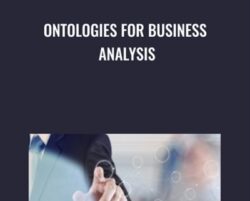What you’ll learnConceptualize ontologies in the context of business analysis, with a focus on their purpose, importance and the underlying business case for their applicationUnderstand how to define and interpret ‘blueprints’ for capturing enterprise domain knowledge through the proper use of the building blocks of ontologies and how they are arrangedAppreciate the importance of the need for superior business modelling flexibility, with a focus on capturing formal semantics (meaning) and logical axioms that are useful for defining business rules and when designing interoperable systemsBecome familiar with the Web Ontology Language (OWL) as well as the basic workings of graph databases. OWL builds upon the W3C specification for the Resource Framework (RDF), which is designed for building knowledge graphs and linking data that have complex relationshipsObtain a high-level understanding of the field of business analysis through suitable ontology exploration tutorialsThe practice of Business Analysis revolves around the formation, transformation and finalisation of requirements to recommend suitable solutions to support enterprise change programmes. Practitioners working in the field of business analysis apply a wide range of modelling tools to capture the various perspectives of the enterprise, for example, business process perspective, data flow perspective, functional perspective, static structure perspective, and more. These tools aid in decision support and are especially useful in the effort towards the transformation of a business into the “intelligent enterprise”, in other words, one which is to some extent “self-describing” and able to adapt to organisational change.However, a fundamental piece remains missing from the puzzle. Achieving this capability requires us to think beyond the idea of simply using the current mainstream modelling tools. Instead, we need to take into account methods that provide a basis for sharing meaning at both human and computational level, and that are geared to capturing the semantics (i.e. the meaning) of entities that describe our enterprise perspectives. This is where the concept of ontologies come in. Ontologies are representations that provide a basis for sharing meaning at human and computational level, and are an invaluable addition to any business analyst’s toolkit.Ontologies help you formally represent domain knowledge that is accurate and reusable, which aligns very well with your reuse strategy for enterprise knowledge. Ontologies are platform-agnostic knowledge models and building them does not require you to have any extensive technical or software engineering skills. This means that as business analyst, you are able to produce the blueprints for any system or software design project, allowing you to more rapidly prototype information structures and test them out before passing your specifications over to software engineers to implement. Consequently, ontology modelling empowers business analysts as information and knowledge architects.In addition, ontologies are extremely relevant to the area of information systems interoperability, providing you with the mechanisms to drive semantic data exchange and federation across multiple information sources and repositories. They can also be extended into structured knowledge bases for constantly-evolving linked data that have complex relationships and are held in dynamic schemas, thereby responding very well to changes in organisational knowledge. The thing is – that’s just a glimpse of some of the useful benefits of ontologies from a business analysis standpoint – ontologies, in practice, do much more than that!Unfortunately, ontology modelling is an underused technique chiefly as a result of a lack of awareness in the industry domain, and because tool support has been relatively limited in the past. But this course is intended to be a game changer, focusing on providing a comprehensive introduction to ontologies in the context of business analysis application, in order to encourage the adoption of the approach. The material provided in the course covers relevant background information to get comfortable with the concepts being explained, the justifications for applying ontologies in business analysis practice, walkthrough examples, and other important details that are pertinent for you to be able to hit the ground running with using ontologies within your own business analysis pipeline. Become a pioneer of applied ontology in the field of business analysis and lead the way to telling your success story!Who this course is for:Professionals who work in the field of business analysis, enterprise analysis, enterprise architecture and knowledge managementChange champions willing to keep abreast of leading-edge methods for supporting enterprise and business transformation programmesData modellers and information architects (but more generally people who work with structured modelling approaches for data and information) who do not have prior exposure to ontologiesPractitioners involved in model-driven and service-oriented architectures with an interest in systems interoperabilityAcademics with an interest in the ground-breaking applications of ontology tools and techniquesNot intended for people looking for training in mathematical logic and ontology theoryCourse content6 sections • 33 lectures • 2h 18m total lengthIntroductionBackground to ontology modellingAnatomy of a machine-interpretable ontologyBenefits of ontologies in Business AnalysisOntology development and deploymentCourse wrap-upGet Ontologies for Business Analysis – Tish Chungoora, Only Price $37Tag: Ontologies for Business Analysis – Tish Chungoora Review. Ontologies for Business Analysis – Tish Chungoora download. Ontologies for Business Analysis – Tish Chungoora discount.
 My Dos and Don’ts of Working with Children: The Union of Creativity and Problem Solving – Lynn Lyons
₹1,826.00
My Dos and Don’ts of Working with Children: The Union of Creativity and Problem Solving – Lynn Lyons
₹1,826.00
 The Dark Side Of Valuation Valuing Old Tech, New Tech, And New Economy Companies – Aswath Damodaran
₹3,818.00
The Dark Side Of Valuation Valuing Old Tech, New Tech, And New Economy Companies – Aswath Damodaran
₹3,818.00
Ontologies for Business Analysis – Tish Chungoora
₹5,478.00





